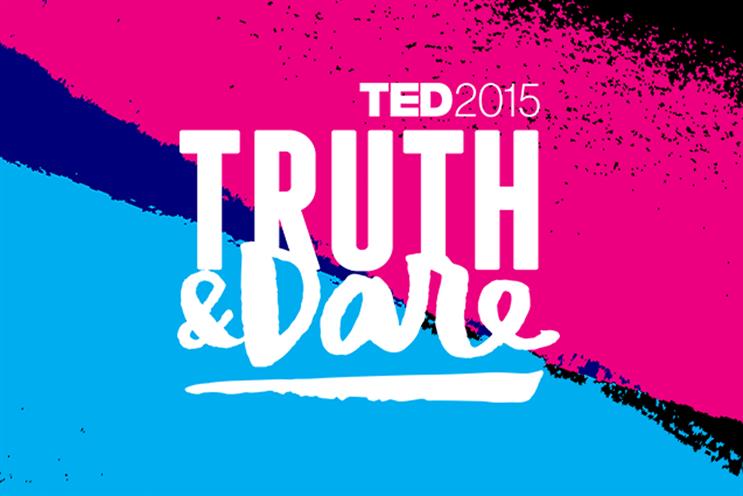
TED2015. It's a pessimists dream. The machines are going to kill us all, pandemics (take your pick) are going to kill us all, the world economy is irreparably knackered, no one can save us from terrorists (domestic, international, stateless or cyber) and everyone is too nasty to everyone else.
TED2015. It’s an optimists dream. We can conquer blindness AND deafness, we can free the slaves, we can reach and live on Mars, we can redesign the entire global economy to save us all and it turns out laughter really IS the best medicine.
Welcome to TED2015. 100+ amazing talks over four days on everything from sexual infidelity to vexillology (look it up). Here’s my top ten:
David Eagleman: We don’t actually "see". The brain lives in the dark and simply receives a set of electrical signals from our eyes and interprets them. This guy has invented a vest that turns soundwaves into vibrations that can make the deaf hear. It’s wearable braille and is truly amazing. Deafness cured. Next!
Monica Lewinsky: Courageous, compelling and scary talk on what it was like to be the victim of the world’s first digital media maelstrom. Quite unimaginable to try and empathise with what it must have been like (and still is) to be "Monica Lewinsky". She’s now back after ten years of silence to highlight and prevent the growth of cyber-bullying in an age where "shame is an industry".
Maryn McKenna: Sometimes at TED you get to watch something that scares the shit out of you – this was it. We’re entering a new age (like, now) where antibiotics will no longer be effective. We’ve overused them and therefore make bugs resistant to them. We are about to re-enter a world where basic surgery and things like childbirth will again kill huge percentages of the world population. The post-antibiotic era. Be afraid.
Sophie Scott: A fabulous discourse on the science of laughter. How and why we do it. The difference between voluntary and involuntary laughter, containing the amazing fact that we are 30 times more likely to laugh when we are with someone than when we’re alone – contagious, indeed.
Ellen Macarthur: Probably my TED highlight. Not content with sailing solo around the world by the time she was 24, she then put her talent, energy and brains to the problem of redefining the entire global economic system. Managing finite resources on a boat for three months became her metaphor for how to manage the finite resources on earth from the current "Linear Economy" to a new "Circular Economy".
Daniel Kish: Occasionally in life you meet or see someone who reminds you just how amazingly resilient and inventive humans are. This guy went blind at 13 months old and taught himself to "see" by using a series of clicks of his tongue. It earned him the nickname "The Amazing Batman" and he’s now teaching FlashSonar to thousands of others.
Kailash Satyarthi: A talk on why it’s good to be angry by a guy who won the Nobel Peace Prize. He says it’s the key to achieving success. Get angry, have an idea, take action. This guy did and has freed over 80,000 child slaves in 15 years.
Esther Perel: Interesting perspective on "the last taboo". Something "universally forbidden, yet universally practiced" – Infidelity. A brilliant talk on why we do it and why it isn’t always a bad thing. Tip: Watch it away from your spouse.
Roman Mars: An incredible talk on vexillology (the science of "flags"). A bed-wettingly funny trip through what makes a good and bad flag as a recipe for what makes great design overall. Watch this. You’ll never regret the 18 minutes.
Trevor Aaaronson: The author of The Terror Factory telling us how the FBI are paying crooks and conmen to set up young, vulnerable and often mentally handicapped Muslim men, providing them with the funds and tools to commit terrorist acts and then conveniently "catching" them in the act to get the figures up to feed PR. Scary stuff.
I’ve left so much out. There’ll be 50,000 of us on Mars by 2050, there’s a guy in San Quentin Prison nicknamed "Wall St" who is one of the most successful financial analysts in America and we don’t know (yet) where 98 per cent of the potentially catastrophically-dangerous asteroids are inside our own solar system.
My fave fact of the week – when Ellen Macarthur was in the Southern Ocean the nearest human being to her was on the International Space Station.
I love TED. As our time gets increasingly squeezed I’m finding people are less and less able to look outside our own industry for interesting and different stimulus, and I’m finding them less interesting as a consequence.
Most conferences seem to consist of agency folk talking to each other about their daily doings, whereas TED never disappoints with its range and depth of content.
I’ll be there next year and I’d encourage all of you to do the same if you get the slightest whiff of a chance to attend.



.jpg)
.jpeg)
